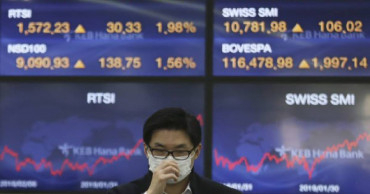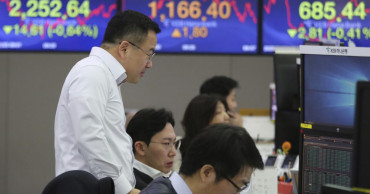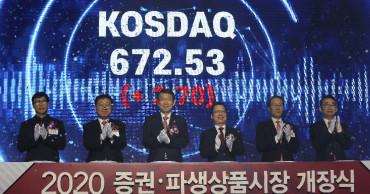Asian markets
Asian markets crash; Nikkei plunges nearly 8%
sian stocks plunged Monday, following Friday’s dramatic sell-off on Wall Street amid escalating trade tensions sparked by U.S. President Donald Trump’s tariff increases and Beijing’s retaliation.
U.S. futures pointed to continued losses. Futures for the S&P 500 declined 2.5%, the Dow Jones Industrial Average futures dropped 2.1%, and Nasdaq futures slid 3.1%.
In Tokyo, the Nikkei 225 fell nearly 8% shortly after markets opened, and by midday, the index was down 6% at 31,758.28. A circuit breaker was briefly triggered, halting trading in Topix futures after a sharp drop in U.S. futures.
Financial stocks were among the hardest hit. Shares in Mizuho Financial Group plunged 11.3%, while Mitsubishi UFJ Financial Group’s stock fell 9.9%, as investors grew increasingly anxious about the potential global economic impact of the trade conflict.
Chinese markets, which often move independently of global trends, also experienced steep losses. Hong Kong’s Hang Seng Index dropped 9.4% to 20,703.30, and the Shanghai Composite Index shed 6.2% to close at 3,134.98.
Shares in tech giants also took a hit, with Alibaba Group Holdings tumbling 10% and Tencent Holdings falling 9.4%.
South Korea’s Kospi declined 4.1% to 2,363.82, and Australia’s S&P/ASX 200 lost 3.8% to 7,377.70, after paring back from earlier losses exceeding 6%.
Oil prices continued their descent, with U.S. benchmark crude dropping 4%, or $2.50, to $59.49 per barrel. Brent crude, the international standard, declined $2.25 to $63.33 a barrel.
In currency markets, the U.S. dollar weakened to 146.70 Japanese yen from 146.94 yen. The yen, typically considered a safe haven in times of financial distress, gained ground. The euro eased to $1.0926 from $1.0962.
Friday marked Wall Street’s most severe downturn since the COVID-19 crisis. The S&P 500 dropped 6%, the Dow fell 5.5%, and the Nasdaq Composite declined 5.8%.
Analysts anticipate heightened market volatility and further dramatic price movements in the near term, as hopes for a quick resolution to the trade dispute remain slim.
Stock Market sees fall in Dhaka, rise in Chittagong on first day after Eid
Nathan Thooft, chief investment officer and senior portfolio manager at Manulife Investment Management, warned that more countries are likely to introduce retaliatory tariffs against the U.S. Given the number of parties involved, “we believe it will take significant time to navigate through the upcoming negotiations.”
He added, “Our overall assessment is that market uncertainty and volatility are likely to continue for an extended period.”
China's response to Trump’s latest tariff escalation intensified global market losses. Despite a surprisingly strong U.S. jobs report—typically the month's main economic highlight—it wasn’t enough to stop the market slide.
So far, the trade war has yielded few if any winners in the financial markets. Beijing's announcement of retaliatory tariffs—including a 34% tariff on all U.S. imports starting April 10—fueled a fresh wave of selling across global exchanges.
As the world's two largest economies, the U.S. and China are central to global economic stability. A major concern is that a prolonged trade war could tip the world into a recession, which may push equity prices even lower. The S&P 500 has already fallen 17.4% from its record high in February.
Trump acknowledged that Americans may experience “some pain” due to tariffs but maintained that the long-term objectives—such as restoring manufacturing jobs to the U.S.—justify the cost. He appeared indifferent to the significant financial losses faced by investors.
From his Mar-a-Lago resort in Florida, Trump headed to his nearby golf course after posting on social media, “THIS IS A GREAT TIME TO GET RICH.”
The Federal Reserve could potentially soften the economic impact of tariffs by lowering interest rates, which generally encourages spending and borrowing. However, Fed Chair Jerome Powell cautioned on Friday that tariffs may drive up inflation expectations, and rate cuts could further stoke price increases.
“Our responsibility is to keep long-term inflation expectations well anchored and to ensure that a one-time rise in price levels does not evolve into persistent inflation,” Powell said.
Much depends on how long Trump’s tariffs remain in place and how other countries respond. Some on Wall Street are still hopeful Trump might reduce tariffs if he can secure favourable outcomes through negotiations.
Stuart Kaiser, head of U.S. equity strategy at Citi, noted in a Sunday briefing to clients that current earnings forecasts and stock valuations do not fully account for the trade war’s potential effects. “There’s still significant room for further decline despite the recent sharp pullback,” he said.
There was no indication from the Trump administration that it intends to ease the tariff policy that has wiped out trillions in market value.
In an interview on Fox News Channel’s “Sunday Morning Futures,” White House trade adviser Peter Navarro reiterated the president’s position, insisting investors should remain calm. He claimed that the administration’s trade strategy would ultimately lead to “the biggest boom in the stock market we have ever seen.”
Shift towards renewable energy both urgent necessity and strategic investment opportunity: BIDA
“People just need to stay put, let the market find its bottom, and not get rattled by the panic driven by the media,” Navarro said.
10 months ago
Asian markets rise modestly after Wall Street’s slow session
Asian markets made modest gains on Wednesday following a subdued session on Wall Street, where buying activity slowed after a broad rally the previous day.
This rally had been driven by optimism that President Donald Trump’s tariffs might not be as extensive as initially feared.
Tesla sales fall by 49% in Europe even as the EV market grows
Hong Kong’s Hang Seng increased by 0.3% to 23,403.40, while the Shanghai Composite index dipped by less than 0.1% to 3,367.98. Tokyo’s Nikkei 225 climbed 0.7% to 38,027.29. Meanwhile, South Korea’s Kospi rose 1.1% to 2,643.94, and Australia’s S&P/ASX 200 advanced 0.7% to 7,999.00.
On Tuesday, the S&P 500 edged up by 0.2% to 5,776.65, following a 1.8% surge on Monday—one of its strongest performances in the past year. The Dow Jones Industrial Average gained 4 points, or less than 0.1%, to 42,587.50, while the Nasdaq composite added 0.5% to 18,271.86.
U.S. stocks have recouped some of their losses after declining 10% below their all-time high earlier this month, marking their first “correction” since 2023. The S&P 500 is now down 6% from its peak, making the market appear less overvalued than before—a key concern after its rapid growth in previous years.
However, Wall Street strategists caution that further volatility is likely, with an April 2 deadline approaching. This date, which Trump has dubbed “Liberation Day,” marks the implementation of tariffs on trading partners that he claims impose a disproportionate burden on the U.S. Monday’s market rally was fueled by hopes that these “reciprocal” tariffs may be more targeted than initially feared.
Even if the tariffs are less severe than expected, the uncertainty surrounding them has already shaken confidence among U.S. consumers and businesses, potentially leading to reduced spending and slowing economic growth.
A report released on Tuesday revealed worsening sentiment among American households. The Conference Board’s consumer confidence index fell more than anticipated, largely due to a steep decline in short-term economic expectations. This measure hit its lowest point in 12 years, remaining “well below the threshold of 80 that typically signals an impending recession.”
Similar to other recent surveys, the data indicated that U.S. households are more concerned about the economy’s future than its current state. Despite this pessimism, economic activity and the job market have so far remained resilient.
On Wall Street, Trump Media & Technology Group surged 8.9% after announcing a partnership with Crypto.com to launch a series of “America-First” investment funds. These exchange-traded funds (ETFs) will include bitcoin and other digital assets, as well as stocks in U.S.-focused industries like energy. Crypto.com will provide the technology infrastructure, custody, and cryptocurrency supply for these ETFs, which will operate under TMTG’s Truth.Fi brand.
BYD reports 2024 revenue over $100b, topping Tesla's sales
Tesla gained 3.4%, fluctuating between minor gains and losses after weak sales data from Europe. Despite this, the stock remains down nearly 29% for 2025.
Homebuilder KB Home fell 5.2% after reporting lower-than-expected profit and revenue for the latest quarter. Homebuilders, already struggling, may face rising costs due to tariffs, which could be passed on to homebuyers. A report on Tuesday indicated that U.S. new home sales in the previous month were slightly weaker than economists had predicted.
In early trading on Wednesday, U.S. benchmark crude oil rose 31 cents to $69.31 per barrel, while Brent crude, the global benchmark, gained 30 cents to $72.69 per barrel.
The U.S. dollar strengthened to 150.47 Japanese yen from 149.86 yen on Tuesday, while the euro slipped to $1.0784 from $1.0790.
11 months ago
Asian markets mixed as DeepSeek boosts Chinese tech stocks
Asian markets showed mixed performances on Friday, with Chinese technology stocks gaining while most other regional equities declined, reports AP.
Japan’s benchmark Nikkei 225 fell 0.72% in afternoon trading to 38,787.02. Australia’s S&P/ASX 200 edged down 0.11% to 8,511.40, while South Korea’s Kospi dropped 0.58% to 2,521.92. Meanwhile, Hong Kong’s Hang Seng gained 0.91% to 21,081.72, and the Shanghai Composite rose 1.01% to 3,303.67.
Hong Kong's post office continues to suspend packages for US as it seeks clarification over tariff
Chinese tech stocks in Hong Kong appeared set to enter a bull market, driven by renewed investor interest following AI model releases from DeepSeek. Xiaomi’s stock climbed 4.81% to 42.50 Hong Kong dollars, Alibaba gained 1.57% to 100.10 Hong Kong dollars, and Tencent, China’s largest video game company, rose 1.57% to 427 Hong Kong dollars.
Japan’s Nikkei could face further pressure due to a stronger yen. According to IG market strategist Yeap Jun Rong, a sharp rise in January’s household spending has reinforced expectations of future rate hikes by the Bank of Japan.
“With both headline and core inflation accelerating over the past two months, the case for additional policy responses to curb pricing pressures remains strong,” Yeap noted.
On Wall Street, the S&P 500 advanced 0.36% on Thursday, while the Dow Jones Industrial Average slipped 0.28% and the Nasdaq composite increased 0.51%.
Investors are also navigating uncertainties related to U.S. President Donald Trump’s tariff policies. While Trump signed executive orders imposing 25% tariffs on Mexico and Canada, concerns over a global trade war have slightly eased after both countries received a 30-day reprieve, suggesting tariffs may be used as a negotiating tool rather than a long-term strategy.
However, Trump proceeded with a 10% tariff on Chinese goods, prompting China to retaliate with levies on U.S. coal, liquefied natural gas, crude oil, agricultural machinery, and large-engine cars. Additionally, China launched an antitrust probe into Google and added two more firms to its unreliable entity list.
In energy markets, benchmark U.S. crude rose 37 cents to $70.98 per barrel, while Brent crude, the global benchmark, gained 47 cents to $74.76 per barrel.
Stock markets open higher on last trading day of the week
In currency trading, the U.S. dollar edged up to 151.85 Japanese yen from 151.35 yen, while the euro slipped slightly to $1.0380 from $1.0383.
1 year ago
High prices, Asian markets could blunt EU ban on Russian oil
The European Union’s groundbreaking decision to ban nearly all oil from Russia to punish the country for its invasion of Ukraine is a blow to Moscow’s economy, but its effects may be blunted by rising energy prices and other countries willing to buy some of the petroleum, industry experts say.
European Union leaders agreed late Monday to cut Russian oil imports by about 90% over the next six months, a dramatic move that was considered unthinkable just months ago.
The 27-country bloc relies on Russia for 25% of its oil and 40% of its natural gas, and European countries that are even more heavily dependent on Russia had been especially reluctant to act.
European heads of state hailed the decision as a watershed, but analysts were more circumspect.
The EU ban applies to all Russian oil delivered by sea. At Hungary’s insistence, it contains a temporary exemption for oil delivered by the Russian Druzhba pipeline to certain landlocked countries in Central Europe.
In addition to retaining some European markets, Russia could sell some of the oil previously bound to Europe to China, India and other customers in Asia, even though it will have to offer discounts, said Chris Weafer, CEO at consulting firm Macro-Advisory.
“Now, for the moment, that’s not financially too painful for Russia because global prices are elevated. They’re much higher than last year,” he said. “So even Russia offering a discount means that it’s probably selling its oil for roughly what it sold for last year also.”
He noted that “India has been a willing buyer” and “China’s certainly been keen to buy more oil because they’re both countries who are getting big discounts on global market prices.”
Still, Moscow has traditionally viewed Europe as its main energy market, making Monday’s decision the most significant effort yet to punish Russia for its war in Ukraine.
“The sanctions have one clear aim: to prompt Russia to end this war and withdraw its troops and to agree with Ukraine on a sensible and fair peace,” German Chancellor Olaf Scholz said.
Ukraine estimated the ban could cost Russia tens of billions of dollars.
Read: Budget to include scheme for whitening black money again
“The oil embargo will speed up the countdown to the collapse of the Russian economy and war machine,” Foreign Minister Dmytro Kuleba said.
Ukrainian President Volodymyr Zelenskyy said in a video address that Ukraine will be pressing for more sanctions, adding that “there should be no significant economic ties left between the free world and the terrorist state.”
Simone Tagliapietra, an energy expert and research fellow at the Brussels-based think tank Bruegel, called the embargo “a major blow.”
Matteo Villa, an analyst at the ISPI think tank in Milan, said Russia will take a pretty significant hit now but cautioned that the move could eventually backfire.
“The risk is that the price of oil in general goes up because of the European sanctions. And if the price goes up a lot, the risk is that Russia starts to earn more, and Europe loses the bet,” he said.
Like previous rounds of sanctions, the oil ban is unlikely to persuade the Kremlin to end the war.
Moscow seized on the new sanctions to try to rally public support against the West, describing it as bent on destroying Russia.
Dmitry Medvedev, the deputy head of Russia’s Security Council who served as the country’s president, said the oil ban aims to reduce the country’s export earnings and force the government to scale down social benefits.
“They hate us all!” Medvedev said on his messaging app channel. “Those decisions stem from hatred against Russia and against all of its people.”
Read: Experts: Iran disrupts internet; tower collapse deaths at 34
Russia has not shied away from withholding energy to get its way. Russian state energy giant Gazprom said it is cutting off natural gas to Dutch trader GasTerra and Denmark’s Oersted company and is also stopping shipments to Shell Energy Europe that were bound for Germany. Germany has other suppliers, and GasTerra and Oersted said they were prepared for a shutoff.
Gazprom previously stopped the flow to Bulgaria, Poland and Finland.
Meanwhile, the EU is urging other countries to avoid placing trade barriers on farm products as Russia’s war increases the risks of a global food crisis.
Zelenskyy has said Russia has prevented the export of 22 million tons of Ukrainian grain, much of it meant for people across the Middle East and Africa. He accused Moscow of “deliberately creating this problem.”
Russian oil delivered by sea accounts for two-thirds of the EU’s oil imports from Moscow. In addition to the EU cutoff of such imports, Germany and Poland have agreed to stop using oil from the northern branch of the Druzhba pipeline.
Agreeing on sanctions against Russian natural gas is likely to prove much tougher because it represents a larger percentage of Europe’s energy mix.
“The very loud and clear message that Moscow will hear is that it will be near impossible for the European Union to get any agreement on blocking gas because gas will not be as easily replicated from other sources in Europe as oil will be,” Weafer said.
3 years ago
Asian shares extend losses as toll from pandemic surges
Asian markets started the week with fresh losses as countries reported surging numbers of infections from the coronavirus that has prompted shutdowns of travel and business in many parts of the world.
5 years ago
Tokyo falls back, other Asian markets track Wall St gains
Shares in most Asian markets tracked overnight gains on Wall Street, but Tokyo's benchmark fell back Tuesday as gnawing concerns over the virus outbreak chilled buying sentiment.
6 years ago
Asian shares mostly higher after rebound on Wall Street
Shares advanced in most Asian markets on Wednesday after a rebound on Wall Street that reversed most losses from a sell-off the day before.
6 years ago
Asian markets gain as China closes down for Lunar New Year
Shares were mostly higher in quiet trading on Friday in Asia as China began a week-long Lunar New Year festival that is being overshadowed by the outbreak of a new virus that has killed 25 people and sickened more than 800.
6 years ago
Asian markets mostly higher on optimism about US-China deal
Asian shares were mostly higher on optimism about a U.S.-China trade deal as regional markets opened the new year's first day of trading Thursday.
6 years ago




.jpg)
.jpg)








